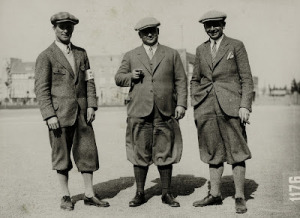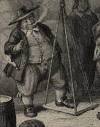Knickers and other words named after people
We probably all know that the wellies we might wear to go on walks through muddy fields are named after the Duke of Wellington, the “Iron Duke”. Perhaps less well known is the link between the mac – in British English, at any rate – that we might also wear and its inventor, the deviser of the waterproof cloth from which macs are made, Charles Macintosh (1766–1843), the Scottish inventor who patented the cloth. Many units of scientific measurement, both everyday and more specialized, are named after their discoverers: the Italian physicist Count Alessandro Volta gave us volts, the Scottish engineer James Watt gave us, er, … watts, and the British Lord Kelvin gave his name to the units in which absolute temperature is measured.
Such words, derived from someone’s name, are technically called eponyms, a word created in the 19th century from the Greek epōnumos “given as a name, giving one’s name to someone or something”, from epi “upon” + onoma “name” (ἐπώνυμος; ἐπί + ὄνομα, Aeolic ὄνυμα name). The same Greek word for “name” has given English also anonymous and synonym(ous). And when people refer to the eponymous hero of such and such a novel, e.g. Fielding’s Tom Jones, they mean that the title of the novel is its protagonist’s name. In modern Greek, επώνυμο (eponimo) is the word for “surname”.
If you enjoy this blog, and find it useful, there’s an easy way for you to find out when I blog again. Just sign up (in the right-hand column, above the Twitter feed) and you’ll receive an email to tell you. “Simples!”, as the meerkats say. I shall be blogging regularly about issues of English usage, word histories, and writing tips. Enjoy!
Knickers!
What the word refers to …
In British English, it refers exclusively to an item of underclothing for girls and women, defined as “A woman’s or girl’s undergarment, covering the body from the waist or hips to the top of the thighs and having two holes for the legs”. In American English it also refers to loose-fitting breeches that are gathered at the knee, known in full as knickerbockers.

Men in baggy knickers! Sooo hot!
That explains why in this quote, Bobby [a boy] is not, as might appear to British readers, indulging an unhealthy fetish for ladies underwear:
Bobby was wearing new lace-up shoes and knickers with long, thick socks like most of the boys in my school.
Hudson Review, Autumn 2004.
In BrE it is also a very mild exclamation of irritation or contempt: “Oh, knickers to the lot of them!”
And it is used in many varieties of English in the idiom “to get one’s knickers in a twist” or variations on that theme, meaning to become angry, upset, or agitated, as in:
The Tories have really got their knickers in a twist over this.
“Knickers” is short for “knickerbockers”.
In 1809, the American novelist Washington Irvine published a History of New York, under the pseudonym of and purporting to be by one Diedrich Knickerbocker. The surname Knickerbocker, and close spelling variants, is Dutch and goes back to the earliest days of New York as a Dutch colony (New Amsterdam), and the word originally meant a descendant of the original Dutch settlers of the New Netherlands in America, hence, a New Yorker.
The dreadful Knickerbocker custom of calling on everybody.
Longfellow, Journal, 1 Jan, 1856
And nowadays it is still occasionally used to refer to New Yorkers (marked in the Oxford Dictionary Online as “informal”, but in Merriam-Webster as “broadly”):
Sex and the City unfolds in an elite New York that Edith Wharton or Nelson Rockefeller wouldn’t recognize. In this city, merit, not pedigree, rules. Unlike the old Knickerbocker establishment, where birth and breeding gave social standing, in this democratic meritocracy it is the prestige of your job that tells us where you are in the social order.
City Journal (New York), autumn 2003.
An edition of the book was illustrated by George Cruikshank (who also illustrated some of Dickens’s work, most notably Oliver Twist), and in it the eponymous hero is shown wearing knee breeches. Soon the word became popular to refer to this kind of trousers, and also to a ladies undergarment, which similarly extended as far as the knee, but has over time become shortened to its modern size–somewhat like the word itself.

These look like bloomers or drawers to me, but I’m no expert.
The two earliest OED examples for those meanings are:
1881 R. Jefferies Wood Magic I. i. 15 It was not in that pocket , … nor in his knickers.
(British, but the OED marks this use as “now U.S.”)
1882 Queen 7 Oct. 328/3, I recommend … flannel knickers in preference to flannel petticoat.
(British)
The OED also includes an amusing citation from Shaw:
Laws … are amended and amended and amended like a child’s knickers until there is hardly a shred of the first stuff left.
G. B. Shaw The Intelligent Woman’s Guide Socialism i. 2, 1928.
Do only Brits wear “knickers”?
The Oxford Dictionary Online labels them “British”, while Merriam-Webster labels this meaning “chiefly British”. The Oxford English Corpus (March 2013 data) paints a different picture, illustrating yet again how the boundaries between different varieties of English are fuzzy.
The total for the string “knickers” in the corpus is 2,827. Filtering out variations on “to get one’s knickers in a twist” leaves 2,526.
Of those, 1,658 (65.6%) are British, 221 (8.7%) American, and 118 (4.7%) Australian. While several of the American English examples refer to knickerbockers, some mirror the British English meaning. Clearly, in the following light-hearted example, the word is used as part of a repertoire of synonyms:
Firstly, Deb is organizing Operation Panty Drop, delivering brand-spankin’-new underpants to people in Houston who’ve been displaced and dispossessed by the hurricane. Send new knickers only, please — seriously, how would you feel if someone handed you a pair of used panties? Well, okay, it depends on the panties, I KNOW THAT, but pretend you don’t get turned on by things like that and just mail her a couple of new pairs of Hanes or something.
Blog (written by a woman), 2005.
Don’t you just love the name of the appeal!

An emergency undergarment drop.
Before I get branded as a paid-up member of the dirty mac brigade, I think I’ll sign off, since this blog is one of a series about eponyms. But I’ll come back to the idiom “knickers in a twist” another time.
Filed under: Word origins,




